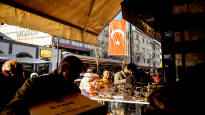DIYARBAKIR On Monday Gülşen Özer may already be on his way to prison. He is a local politician from the pro-Kurdish HDP party, i.e. the People’s Democratic Party.
Now sitting in the party office in Diyarbakır, the unofficial capital of Turkey’s Kurdish region, he doesn’t seem discouraged. He faces a maximum of 30 years in prison for being a member of a terrorist organization.
According to Özer, the evidence for the terrorist accusations has been gathered from his public appearances.
– There is nothing secret about my work. Press conferences and political meetings are not secret. The message is that the Kurds are not allowed to make politics and make demands, that’s what this is all about, says Özer.
The final hearing of the trial is scheduled to be held on Monday. If Özer is sentenced to the maximum sentence, he will be sent to prison, even if he appeals his sentence.
After the 2019 local elections, he became the deputy mayor of the city of Bismil. However, the mayors and city managers representing the HDP have been fired and replaced by employees of the Turkish Ministry of the Interior.
A peaceful atmosphere in Diyarbakır
Today, Diyarbakır is a peaceful city, although here and there you can see armored police vehicles.
Even in 2015, the city was a battlefield. The old city, Sur, located near the city walls, was reduced to ruins by the fighting between the Kurdistan Workers’ Party (PKK) and the security forces.
Now the old town has been rebuilt, but it seems that a large part of the inhabitants have not returned.
The state has promised new apartments for those affected by the fighting, but for example Turkish Association of Architects (you will switch to another service) has said that only a small part of the former residents have been allowed to return home. The authorities have dismissed the criticism.
Some of the former residents have also received apartments elsewhere in Diyarbakır.
At the bazaar, the president gets a ride
On the street near the bazaar, you can see both the Turkish flag and the picture of President Recep Tayyip Erdoğan.
In the bazaar, you can also hear loud talk about the president.
– There is nothing here, neither work nor life. If people protest, they are persecuted and severely pressured. This is what I say and let them take me to be hanged when I speak here, says the angry man.
The speech ends like cutting with a knife when the man sees the police patrol approaching. However, the police continue their journey without interfering with the interview.
The man continues barking at President Erdoğan.
– I hope he loses power. Then freedom would come and the persecution and torture of people would end. This is what I say as a Muslim.
A young bazaar merchant, who gets to the ballot box for the first time, first praises President Erdoğan effusively. After a while, he will tell you that he didn’t dare to say anything else.
The other merchants laugh and someone exclaims a famous phrase in Turkey:
– It’s cold in Silivri.
It refers to the giant prison west of Istanbul, where, according to human rights organizations, numerous political prisoners are held.
Some are afraid to speak
In front of the cafe located in the courtyard of a beautiful old house, the atmosphere is subdued despite the fine surroundings. A young woman who wishes to remain anonymous says that there is no democracy in Turkey. He seems scared.
– I don’t really want to say what I think, it’s hard to talk here. It’s sad and haunts me.
One of the merchants in the bazaar says in Kurdish that he hopes that the pro-Kurdish HDP party will win, because the Kurds must defend their own language.
Kurdish politician Gülşen Özer, who will possibly end up in prison next week, talks about freedom and his own culture.
– Because I am Kurdish, I want to live as a Kurd. I want to raise my children in Kurdish culture. It also includes the right to one’s own school. Now a few hours of voluntary mother tongue teaching are offered, it is not enough, says Özer.
“Now the politicians’ families are also in the sights”
Özer says that fighting for Kurdish rights is not easy, but he cannot change: he is Kurdish.
– I never thought I would leave here, but I don’t criticize those who have decided to go abroad. Previously, only our politicians were attacked here, now the whole family is targeted. Children of politicians may be prevented from working, for example.
The line of President Erdoğan and his Justice and Development Party has swung from side to side on the Kurdish question. Sometimes there have even been negotiations with the PKK, reforms and rights have been offered, sometimes a strict line has been followed.
Based on the fate of many Kurdish politicians, it seems that if something is to be done, the initiative must come from the top in the presidential palace, not from the grassroots.
